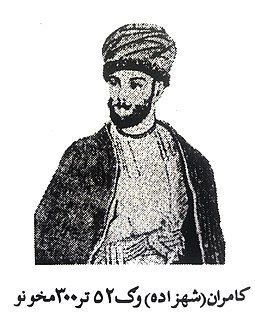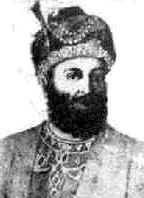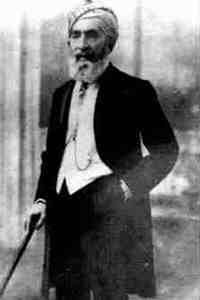 W
WThe two branches of the Barakzai dynasty ruled modern day Afghanistan from 1823 to 1973 when the monarchy ended under Musahiban Mohammed Zahir Shah. The Barakzai dynasty was established by Dost Mohammad Khan after the Durrani dynasty of Ahmad Shah Durrani was removed from power.
 W
WThe Durrani dynasty was founded in 1747 by Ahmad Shah Durrani at Kandahar, Afghanistan. He united the different Pashtun tribes and created the Durrani Empire with his Baloch allies, which at its peak included the modern-day Afghanistan, Pakistan, as well as some parts of northeastern Iran, eastern Turkmenistan, and northwestern India including the Kashmir region. The Durranis were replaced by the Barakzai dynasty during the early half of the 19th century.
 W
WKamran Shah Durrani was born in the Sadozai dynasty. He was the son of Mahmud Shah Durrani, grandson of Timur Shah Durrani and the great grandson of Ahmad Shah Durrani, the founder of the Durrani Empire. He was deposed and killed in early 1842, by his vizier Yar Mohammad Khan Alakozai.
 W
WTimur Shah Durrani, was the second ruler of the Durrani Empire, from 16 October 1773 until his death in 1793. An ethnic Pashtun, he was the second eldest son of Ahmad Shah Durrani.
 W
WZaman Shah Durrani, was ruler of the Durrani Empire from 1793 until 1801. He was the grandson of Ahmad Shah Durrani and the fifth son of Timur Shah Durrani. An ethnic Pashtun, Zaman Shah became the third King of the Durrani Empire.
 W
WAhmad Shāh Durrānī, also known as Ahmad Khān Abdālī, was the founder of the Durrani Empire and is regarded as the founder of the modern state of Afghanistan. In July 1747, Ahmad Shah was appointed as the King of Afghanistan by a loya jirga in Kandahar, where he set up his capital. Assisted by a council of nine advisers from various Afghan tribes, Ahmad Shah pushed east towards the Mughal and Maratha Empires of India, west towards the disintegrating Afsharid Empire of Iran, and north towards the Khanate of Bukhara of Turkestan. Within a few years, he extended his control from Khorasan in the west to Kashmir and North India in the east, and from the Amu Darya in the north to the Arabian Sea in the south.
 W
WAyub Shah, son of Timur Shah, ruled Afghanistan from 1819 to 1823. He was an Afghan from the Pashtun ethnic group. He was the second oldest son of Timur Shah. He killed his brother Ali Shah for the throne. He only ruled four years, holding off his own brothers and the Barakzai and Indian tribes from nearby. He was imprisoned by the Barakzai and his brother took the throne, shortly losing it to the Barakzai.
 W
WMahmud Shah Durrani ; 1769 – April 18, 1829) was born Prince and the ruler of the Durrani Empire (Afghanistan) between 1801 and 1803, and again between 1809 and 1818. From 1818 to 1829 he was the ruler of Herat. An ethnic Sadduzai tribe section of the Popalzai sub clan of the Durrani Pashtuns, he was the son of Timur Shah Durrani and grandson of Ahmad Shah Durrani.
 W
WPadshah Sultan Shah Shuja Durrani was ruler of the Durrani Empire from 1803 to 1809. He then ruled from 1839 until his death in 1842. Son of Timur Shah Durrani, Shuja Shah was of the Sadduzai line of the Abdali group of Ethnic Pashtuns. He became the fifth Emir of Afghanistan.
 W
WMirwais Khan Hotak, (1673–1715), was a Pashtun from Kandahar, Afghanistan and the founder of the Hotak dynasty that existed from 1709 to 1738.
 W
WAbdur Rahman Khan GCSI was Emir of Afghanistan from 1880 to his death in 1901. He is known for uniting the country after years of internal fighting and negotiation of the Durand Line Agreement with British India.
 W
WGhazi Amanullah Khan was the sovereign of Afghanistan from 1919 until his abdication in 1929, first as Emir and after 1926 as King. After the August 1919 end of the Third Anglo-Afghan War, Afghanistan was able to relinquish its protected state status to proclaim independence and pursue an independent foreign policy free from the influence of the United Kingdom.
 W
WGhazi Mohammad Ayub Khan also known as The Victor of Maiwand or The Afghan Prince Charlie was, for a while, the governor of Herat Province in the Emirate of Afghanistan. He was Emir of Afghanistan from 12 October, 1879 to 31 May, 1880. He also led the Afghan troops during the Second Anglo-Afghan War and defeated the British Indian Army at the Battle of Maiwand. Following his defeat at the Battle of Kandahar, Ayub Khan was deposed and exiled to British India. However, Ayub Khan fled to Persia. After negotiations in 1888 with Sir Mortimer Durand, the ambassador at Tehran, Ayub Khan became a pensioner of the British Raj and traveled to British India in 1888, where he lived until his death in 1914 in Lahore, Punjab. He was buried in Peshawar and had eleven wives, fifteen sons, and ten daughters. Two of his grandsons, Sardar Hissam Mahmud el-Effendi and Sardar Muhammad Ismail Khan, served as brigadiers in the Pakistan Army.
 W
WEmir Dost Mohammad Khan Barakzai, nicknamed the Amir-i Kabir, was the founder of the Barakzai dynasty and one of the prominent rulers of Afghanistan during the First Anglo-Afghan War. With the decline of the Durrani dynasty, he became the Emir of Afghanistan in 1826. He was the 11th son of Payendah Khan, chief of the Barakzai Pashtuns, who was killed in 1799 by King Zaman Shah Durrani.
 W
WHabibullah Khan was the Emir of Afghanistan from 1901 until his death in 1919. He was the eldest son of the Emir Abdur Rahman Khan, whom he succeeded by right of primogeniture in October 1901. His grandfather was Mohammad Afzal Khan.
 W
WMohammad Afzal Khan was the Emir of Afghanistan from May 1866 to 1867. The oldest son of Dost Mohammad Khan, Afzal Khan was born in Kabul in 1815. His father died on 9 June 1863 and a civil war broke out between Dost Mohammad Khan's sons. In May 1866 he seized power from his brother Sher Ali Khan and captured Kabul. Eventually contracted cholera and died on 7 October 1867. Following Afzal Khan's death, Mohammad Azam Khan was proclaimed Amir of Afghanistan. He was an ethnic Pashtun and belong to the Barakzai tribe.
 W
WMohammad Azam Khan was the Emir of Afghanistan from October 7, 1867 to August 21, 1868. He was born in 1820 and was the fifth son of Dost Mohammed Khan. Azam Khan succeeded his brother Mohammad Afzal Khan after the latter's death on October 7, 1867. Sher Ali Khan was reinstated as Amir of Afghanistan and his forces captured Kabul on August 21, 1868. Sher Ali himself entered Kabul on September 8, 1868. Mohammad Azam Khan fled to Sistan and then to Iran, where he died in 1870. He was an ethnic Pashtun and belonged to the Barakzai tribe.
 W
WMohammad Yaqub Khan was Emir of Afghanistan from February 21 to October 12, 1879. He was the son of the previous ruler, Sher Ali Khan.
 W
WSher Ali Khan was Amir of Afghanistan from 1863 to 1866 and from 1868 until his death in 1879. He was one of the sons of Dost Mohammed Khan, founder of the Barakzai Dynasty in Afghanistan.
 W
WWazīr Akbar Khān, born Mohammad Akbar Khān and also known as Amīr Akbar Khān, was an Afghan prince, general, emir for a year, and finally wazir/heir apparent to Dost Mohammad Khan until his death in 1847. His fame began with the 1837 Battle of Jamrud, while attempting to regain Afghanistan's second capital Peshawar from the Sikh Empire.
 W
WNasrullah Khan (1874–1920), sometimes spelt as Nasr Ullah Khan, was shahzada of Afghanistan and second son of Emir Abdur Rahman Khan. He held the throne of Afghanistan as Emir for one week, from 21 to 28 February 1919.